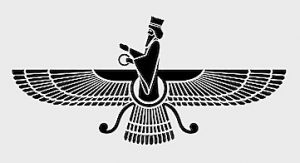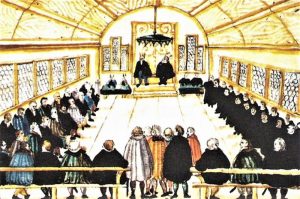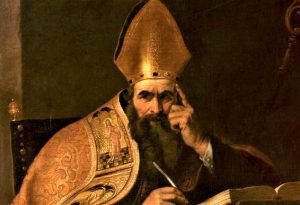Calvinism
The term Calvinism is considered an ambiguous term because it is used from different points of view. Sometimes, it indicates the teaching of John Calvin, other times a system of doctrines professed by Protestant churches and can even be used as a set of theological, ethical, social and political concepts, which, under the influence of Calvin, had power and dominated the post-reform lands leaving an important mark on human thought, history, the social order of civilizations and the political organization of each State.

Related topics
John Calvin
What is Calvinism?
Calvinism is a term that can refer to the set of doctrines professed by Protestant churches, but at the same time, it is a set of theological, ethical, social and political concepts that left an important mark on society.
About Calvinism
John Calvin’s main objective was to spread his ideas in order to understand the different matters of faith that Marin Luther had established, and for this purpose, he sought refuge in Switzerland, as he was persecuted in his native town. According to Calvin, the principle of absolute predestination was the only one responsible for explaining the fate of men on Earth. This principle defended the idea that, depending on God’s will, some chosen ones would have the right to eternal salvation and others would be condemned to hell. God’s favor was closely associated with the way in which one lived a materially prosperous life through work and the withdrawal of material whims.
Characteristics of Calvinism
Calvinism bases its beliefs on Christ.
- It refers to all designs coming from God, who is the one who has total authority over things.
- It can be defined as a system of Protestant Christian theology.
- They do not consider the priesthood as a sacrament.
- They declare absolute belief in God and His sovereignty.
- Salvation for Calvinists is not won by good works, but by faith in the grace of God.
- For them, God is sovereign, omnipotent and intervenes in all fields of human life.
- Man is totally dependent on God.
- They are based on the five points of Calvinism.
Origin
Calvinism was created during the 16th century by the French born religious Juan Calvino, who is thought to have been the author of the Protestant Reformation in Switzerland. John Calvin was born in July 1509 in Noyon, France, and studied at the best universities of Law and Theology. At the age of 21, he converted dramatically from tradition-centered Catholicism to radical, biblical and evangelical faith in Christ and his Word. He was a preacher in Geneva for 25 years, until he died at the age of 54 in May 1564.
History
Calvin had a great influence on Protestant doctrines. His work called Institution of the Christian Religion, is the source of the repercussion that have had their beliefs in Protestantism in history, and this is why it is called Calvinism. After the Catholic Church excommunicated Martin Luther, Calvin sought refuge in Geneva. In the 16th century, Calvinism spread throughout the Netherlands, Germany, France and England.
Founder
The founder of Calvinism was called Juan Calvino. He was born in Noyon, on July 10, 1509 in Geneva, his Latin name is written as Calvinus. He was a French theologian and was considered one of the fathers of the Protestant Reformation. Later, the fundamental doctrines of other reformers would identify with him, calling these doctrines “Calvinism”.
Calvinism doctrine
This doctrine is not new, on the contrary, it is old. This doctrine firmly denies that priestly ordination is a church sacrament. Among its main beliefs are the belief in the absolute sovereignty of God and the doctrine of justification by faith alone. It teaches us that salvation can be obtained by grace and not by good works, and for this it is necessary to believe or trust in Jesus and see Christ as the only and sufficient Savior. It also teaches that people are utterly incapable of following God or escaping condemnation before Him and that we all depend upon His mercy.
The five points of Calvinism
- Total depravity: indicates that humans are totally depraved beings and that the sin of man has spread throughout his personality, thoughts, emotions and will. This does not mean that they are sinful, but that it is the sin that has taken hold of them.
- Unconditional choice: explains that God is the one who chooses before the foundation of the world, the people he wants to bring them to his knowledge, in this way He chooses who will have salvation and who will be condemned.
- Limited Atonement: also called particular redemption and is a doctrine that asks about the sins of which person Christ This doctrine has been greatly questioned by people as an obstruction to evangelism.
- Irresistible grace: this is the positive response to the inward call of the Holy Spirit when the call is made by the preacher since, Christ teaches us, all will come to knowledge when the Father calls them.
- Perseverance of the Saints: teaches that the saints that God has saved will be in God’s hands until they are glorified and taken to heaven. At this point it is trusted that Christ will fulfill His promises by preserving and protecting all His elect.
Sacraments
Calvinism only have two sacraments:
- The first one is Baptism by which man is washed from all sin.
- The second is the Lord’s Table, by means of which it is assured that man attains redemption.
For the Calvinists, the priestly order is an insult to Christ.
Importance
The spread of Calvinism within human activity was extremely important for a world emerging from an agrarian and medieval economy in a commercial and industrial age. Calvin accepted capitalism and encouraged trade and production, while opposing the abuses of exploitation and complacency. Industrialization was stimulated by the concepts of savings, industry, sobriety, and responsibility that Calvin preached as essential to the achievement of God’s kingdom on earth.
Neo-Calvinism
The term neo means new and Calvinism and Protestantism was created by Calvin. This term was created by Calvin’s opponents. They believe that there is a new awakening in the evangelical churches focused on the doctrines of grace and the reform of thought. They promote the projection of the image of the pastor at an international level, broaden the way in which cults are developed, adopt modern rhythms of music for their cults and there is a continuity in charismatic gifts. It is based on science, culture, society, tolerance, humanism and unity that succeed in impacting society in its way of building a new world.
How to cite this article?
Briceño V., Gabriela. (2019). Calvinism. Recovered on 3 January, 2025, de Euston96: https://www.euston96.com/en/calvinism/









